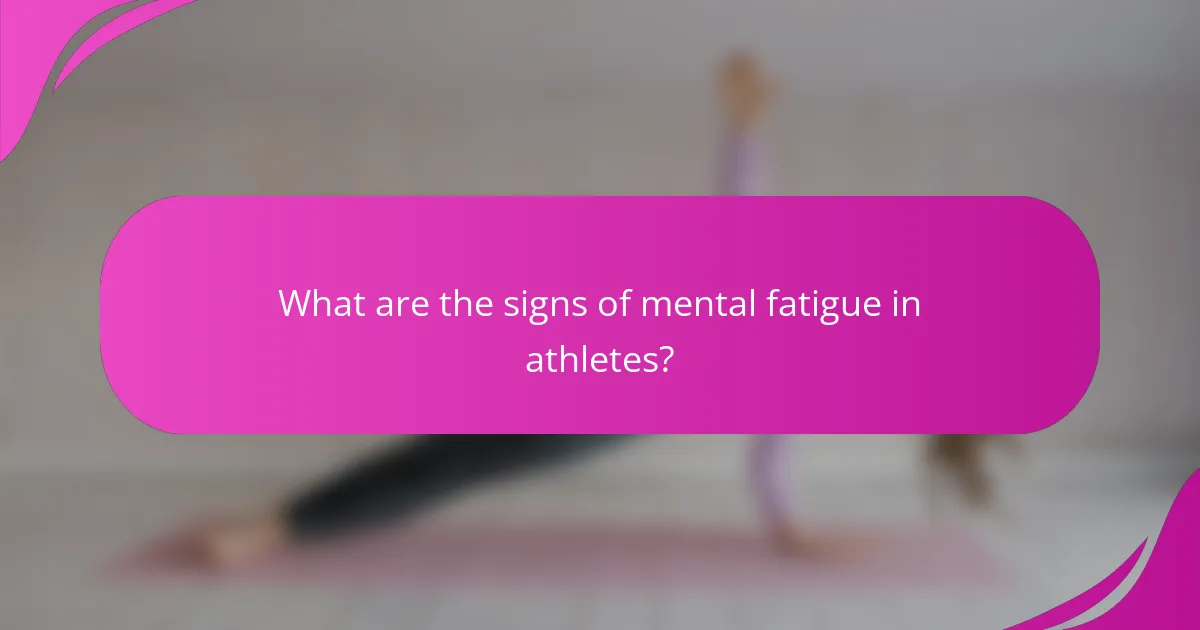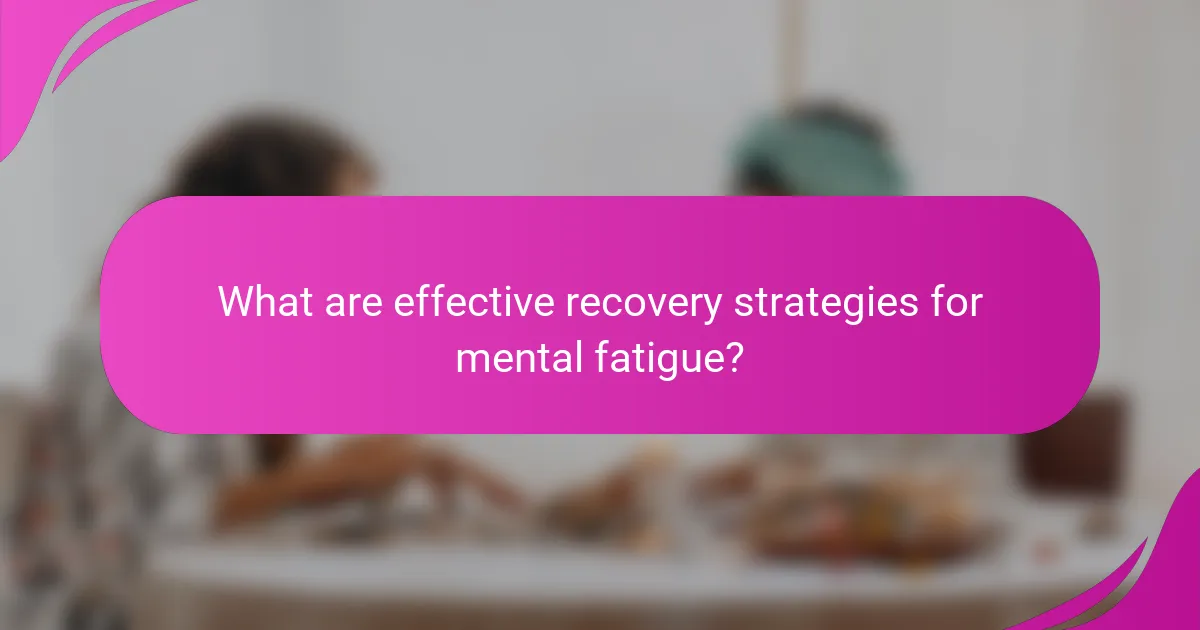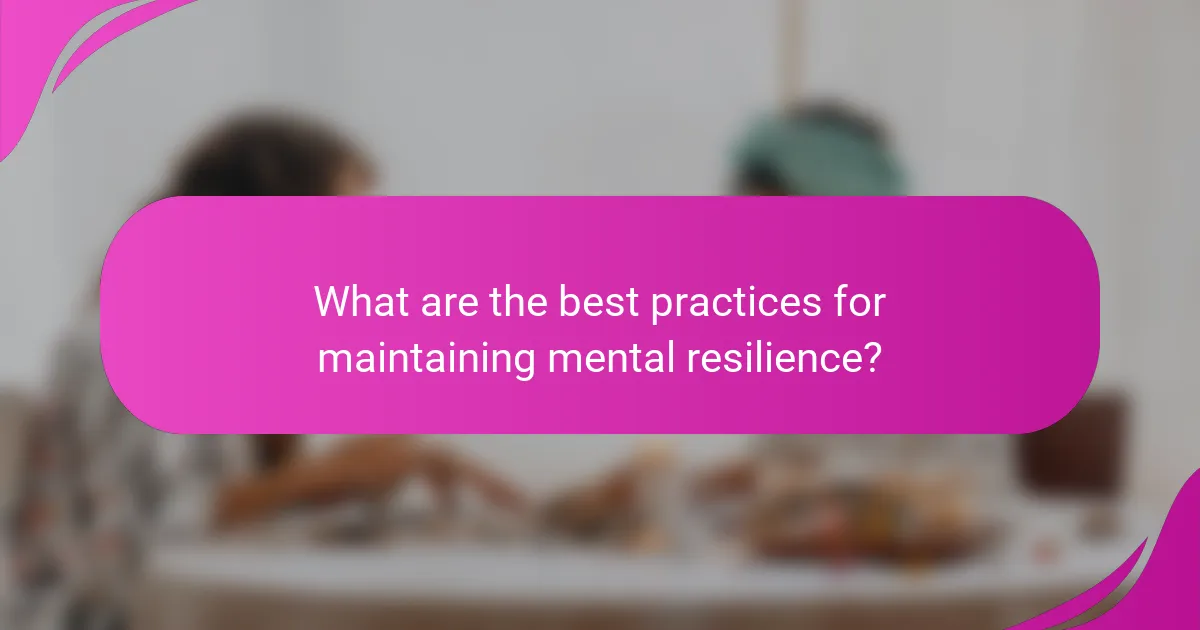Mental fatigue can significantly hinder athletic performance, leading to decreased motivation and increased risk of burnout. Effective recovery strategies include rest, hydration, and mental exercises. Unique methods such as mindfulness meditation and power naps can enhance focus. Additionally, incorporating creative visualization and nature immersion can further support mental resilience and recovery.

What are the signs of mental fatigue in athletes?
Mental fatigue in athletes manifests through decreased motivation, increased irritability, and difficulty concentrating. These signs can hinder performance and lead to burnout if unaddressed. Monitoring mental state is crucial for maintaining focus and optimizing recovery strategies. Regular assessments can help identify mental fatigue early, allowing for timely interventions.
How does mental fatigue impact athletic performance?
Mental fatigue significantly hinders athletic performance by reducing focus, decision-making, and physical endurance. Athletes experiencing mental fatigue may struggle with concentration, leading to mistakes and decreased motivation. Effective recovery strategies include mindfulness practices, adequate rest, and nutrition optimization. These methods help restore mental clarity, enhance performance, and prevent burnout, ensuring athletes can maintain peak performance levels.
What are the common causes of mental fatigue for athletes?
Common causes of mental fatigue for athletes include excessive training, lack of sleep, high stress levels, and insufficient recovery. These factors can diminish focus, hinder performance, and increase the risk of burnout. Addressing these issues is crucial for optimal mental health in sports.

What are effective recovery strategies for mental fatigue?
Mental fatigue recovery strategies for athletes include rest, hydration, and mental exercises. Prioritising sleep enhances cognitive function and focus. Hydration maintains energy levels and reduces fatigue. Mindfulness techniques improve mental clarity and resilience, preventing burnout. Regular breaks during training sessions can also enhance performance and recovery.
How does proper nutrition aid in mental recovery?
Proper nutrition significantly aids mental recovery by providing essential nutrients that enhance cognitive function and reduce fatigue. Balanced diets rich in omega-3 fatty acids, antioxidants, and vitamins improve brain health and focus. For example, foods like fatty fish, berries, and leafy greens boost neurotransmitter function, promoting mental clarity. Hydration also plays a critical role; dehydration can impair cognitive performance. Athletes who prioritise nutrition can experience faster recovery, improved concentration, and reduced risk of burnout.
What specific nutrients are beneficial for mental fatigue recovery?
Certain nutrients significantly aid in mental fatigue recovery for athletes. Omega-3 fatty acids, found in fish and flaxseeds, enhance cognitive function. B vitamins, especially B6, B12, and folate, support energy production and brain health. Antioxidants like vitamin C and E protect against oxidative stress. Magnesium helps regulate neurotransmitters, improving mood and focus. Iron is crucial for oxygen transport, preventing fatigue. Adequate hydration is essential for optimal brain performance. These nutrients collectively enhance focus, performance, and prevent burnout.
What role does sleep play in mental recovery?
Sleep is crucial for mental recovery as it enhances cognitive function and emotional stability. Adequate sleep allows athletes to process experiences, consolidate memories, and restore energy levels. Research indicates that quality sleep improves focus, decision-making, and overall performance. Furthermore, sleep deprivation can lead to increased mental fatigue and burnout, hindering athletic potential. Prioritising sleep is a fundamental strategy for athletes to optimize mental recovery and maintain peak performance.
How can athletes improve their sleep quality?
Athletes can improve sleep quality through consistent sleep schedules, optimal sleep environments, and relaxation techniques. Prioritise a regular bedtime to regulate circadian rhythms. Create a dark, cool, and quiet bedroom to enhance sleep conditions. Incorporate relaxation strategies like meditation or deep breathing before sleep to reduce mental fatigue. These practices collectively promote better recovery and performance.
What are the benefits of mental training techniques?
Mental training techniques provide numerous benefits for athletes, including improved focus, enhanced performance, and effective burnout prevention. These strategies help athletes manage mental fatigue, allowing for better concentration during training and competition. As a result, athletes can achieve peak performance consistently. Additionally, mental training fosters resilience, enabling athletes to cope with stress and pressure more effectively.
Which mental training techniques are most effective?
Mindfulness meditation, visualization, and cognitive restructuring are the most effective mental training techniques. These strategies enhance focus, improve performance, and facilitate recovery from mental fatigue. Mindfulness meditation reduces stress and increases awareness. Visualization helps athletes mentally rehearse and prepare for competition. Cognitive restructuring shifts negative thought patterns, promoting a positive mindset. Implementing these techniques can significantly prevent burnout and optimize athletic performance.

What unique recovery methods can enhance focus?
Unique recovery methods to enhance focus include mindfulness meditation, power naps, and structured breathing exercises. Mindfulness meditation improves concentration and reduces mental fatigue by promoting present-moment awareness. Power naps, lasting 10 to 20 minutes, can rejuvenate cognitive function and boost alertness. Structured breathing exercises, such as the 4-7-8 technique, help regulate stress and enhance mental clarity, making them effective tools for athletes seeking to recover from fatigue.
How can mindfulness practices contribute to mental clarity?
Mindfulness practices significantly enhance mental clarity by reducing stress and improving focus. Techniques such as meditation and breathing exercises help athletes regain mental sharpness, facilitating better decision-making during performance. Research indicates that regular mindfulness practice can lead to a 20% increase in concentration levels. Additionally, these practices foster emotional regulation, which is crucial for maintaining composure in high-pressure situations. As a result, athletes experience improved performance and a lower risk of burnout.
What is the role of visualization in performance enhancement?
Visualization plays a crucial role in performance enhancement by aiding mental fatigue recovery for athletes. It enhances focus, boosts confidence, and prepares the mind for optimal performance. Athletes who utilize visualization techniques report reduced anxiety and improved concentration. Studies indicate that mental imagery can increase motivation and help prevent burnout by fostering a positive mindset.

What rare strategies can prevent burnout in athletes?
To prevent burnout in athletes, implementing rare strategies such as mindfulness meditation, creative visualization, and nature immersion can be effective. These techniques enhance mental recovery and improve focus. Mindfulness meditation reduces stress and promotes emotional regulation, allowing athletes to maintain performance under pressure. Creative visualization helps athletes mentally rehearse their performance, building confidence and reducing anxiety. Nature immersion, or spending time in natural settings, has been shown to lower cortisol levels and improve mood, aiding in recovery.
How does social support influence mental recovery?
Social support significantly enhances mental recovery by providing emotional and practical resources. Positive interactions with teammates and coaches foster resilience, reducing feelings of isolation. Studies show that athletes with strong social networks experience lower levels of mental fatigue and improved focus. This support system acts as a buffer against stress, promoting better performance and preventing burnout.
What innovative technologies are available for mental fatigue recovery?
Innovative technologies for mental fatigue recovery include neurofeedback, virtual reality, and cognitive training apps. These tools enhance focus, improve cognitive performance, and help prevent burnout. Neurofeedback trains brain activity to optimize mental states, while virtual reality provides immersive environments for relaxation and mindfulness. Cognitive training apps offer personalized exercises to strengthen mental resilience.

What are the best practices for maintaining mental resilience?
To maintain mental resilience, athletes should implement strategies that promote recovery from mental fatigue. Prioritise regular breaks to recharge focus and energy. Incorporate mindfulness techniques to enhance mental clarity and reduce stress. Establish a supportive environment that encourages open communication and teamwork. Lastly, ensure adequate sleep and nutrition to optimize cognitive function.
How can athletes create a personalized recovery plan?
Athletes can create a personalized recovery plan by assessing their unique mental fatigue levels and setting specific goals. Incorporate techniques such as mindfulness, scheduled breaks, and cognitive exercises to enhance focus. Regularly evaluate progress and adjust strategies based on performance metrics to prevent burnout.
What common mistakes should athletes avoid during recovery?
Athletes should avoid overtraining, neglecting nutrition, skipping rest days, and ignoring mental health during recovery. These mistakes can hinder focus and lead to burnout. Proper recovery strategies enhance performance and prevent mental fatigue. Prioritise balanced nutrition, adequate sleep, and mental relaxation techniques to optimize recovery.
What expert insights can guide mental fatigue management?
To manage mental fatigue effectively, athletes can adopt strategies that enhance focus and prevent burnout. Prioritising adequate rest, utilizing mindfulness techniques, and implementing structured training schedules are essential. Research shows that incorporating short breaks during training boosts cognitive function, leading to improved performance. Additionally, nutrition plays a crucial role; a balanced diet rich in omega-3 fatty acids can significantly reduce mental fatigue. Engaging in regular physical activity outside of sport-specific training helps maintain overall mental health, supporting resilience against fatigue.